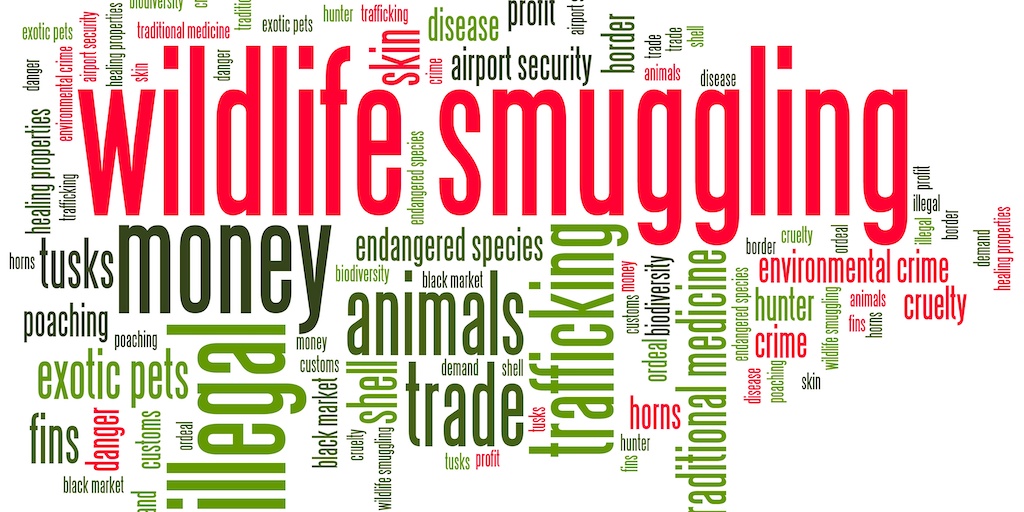Sunandan Chakraborty, assistant professor, Data Science in the Indiana University School of Informatics and Computing at IUPUI has been awarded a $216,590 National Science Foundation grant for his project “An Interdisciplinary Approach to the Discovery, Analysis, and Disruption of Wildlife Trafficking Networks.” Chakraborty is Principal Investigator on The Disrupting Operations of Illicit Supply Networks (D-ISN) project, which is a collaborative effort between IU, NYU, and CUNY.
Interpol estimates the illegal trade in wildlife to be worth up to USD 20 billion per year (Source: UNEP-INTERPOL Report: The Rise of Environmental Crime). Wild flora and fauna can be exploited by criminals along the entire supply chain, from poaching and transportation to processing and selling. Other illegal activities are often associated with wildlife crimes, including money laundering, corruption and document fraud.
According to the grant abstract, “This project aims to address the illegal trade in wild animals. Wildlife trafficking is one of the most common illicit activities globally and poses a substantial human cost along with detrimental social and economic impacts, including increased crime, violence, and environmental destruction. The COVID-19 pandemic, likely the result of a virus that spread to humans from a wildlife market, demonstrates that wildlife trafficking can have serious public health and biosafety implications.”
This project seeks to catalyze technological innovations by creating tools that empower domain experts to continuously discover and obtain actionable insights by exploring the wealth of data related to illicit networks that spread over multiple sources. The project will advance our nation’s ability to counter wildlife trafficking activities through novel approaches for data discovery, analytics, and modeling. The project will also promote the progress of research in criminal activities that have an online footprint. Data collected in the course of the project will be made publicly available through a dataset search engine, making it possible for researchers to enrich data-driven analyses through the dynamic discovery and linkage of previously unknown data, and allowing them to answer important questions. The project team’s collaboration with non-governmental organizations and discussions with law enforcement agencies will facilitate an interactive process that can fine-tune disruption techniques and suggest pragmatic real-world implementation strategies and policy recommendations.
“Wildlife trafficking is one of the most common illicit activities globally, and it is one of the greatest threats to biodiversity. We see significant increase in these activities as online platforms create new channels to connect sellers and buyers involved in this illegal trade. Coping with the more recent trends requires the development of innovative technologies that will provide enforcement agencies with powerful tools and the civil society to be more aware and stop this practice. In this project, we aim to design new algorithms and techniques to discover connections and relationships across disparate data sources, as well as to empower domain experts to interrogate large collections for data discovery and analytics and eventually to understand and disrupt illicit networks,” Chakraborty said.
Interdisciplinary methods and tools advance data research
The project uses an interdisciplinary approach—combining methods and tools from computer science and engineering as well as wildlife criminology to advance the state of the art and build fundamental knowledge in methods for the discovery and exploration of data related to illicit activities with an online footprint, as well as enhance wildlife trafficking research. Specifically, this project contributes new algorithms that provide capabilities to: 1) discover and automatically collect data related to wildlife trafficking from multiple platforms at an unprecedented scale; and 2) use these data to build computational models and study wildlife trafficking patterns and networks at the global level.
Through the use of analytical techniques such as crime mapping, quantitative data analysis, and social network analysis, this project will address research questions related to the scale and the nature of illicit wildlife trade, network structures of online wildlife trafficking, and empirically-driven disruption models that can be used to best tackle them. The algorithms are adaptable to different domains and data, support the discovery of both unstructured data and structured datasets, and will serve as the basis for usable tools that empower domain experts to continuously discover and monitor relevant data.
Davide Bolchini, professor and Human-Centered Computing department chair, said “We are very happy to see that the NSF awarded this important interdisciplinary project to our faculty. This is exemplary research that advances AI for addressing the pervasive problems of illegal trafficking. By identifying computational methods to combat illegal trade networks that are concealed from public view and use a variety of online disguises to circumvent the law, Sunandan’s AI work in this area has the potential to have a larger, positive societal impact.”
This award reflects NSF’s statutory mission and has been deemed worthy of support through evaluation using the Foundation’s intellectual merit and broader impacts review criteria.
NSF Disclaimer
Any opinions, findings, and conclusions or recommendations expressed in this material are those of the author(s) and do not necessarily reflect the views of the National Science Foundation.
Media Contact
Joanne Lovrinic
jebehele@iu.edu
317-278-9208


